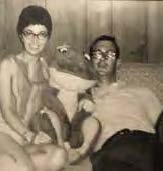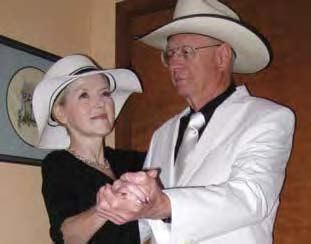
This alumnus wrote part of his dissertation at Santa Monica State Beach. He would study the DNA of bacteriophages, then look up to enjoy views of the ocean with his first wife, Marilyn Huskey. The couple, who spent most of their youth in landlocked Norman, OK, rarely plunged into the Pacific Ocean’s cold surf.
He had pursued mathematics at the University of Oklahoma and planned to become a high school teacher until a simple experiment demonstrating how the sun affects the growth of plants illuminated for him the beauty and complexity of nature. He was hooked. After he earned a master’s degree in botany, a professor told him that if he wanted a doctorate, there was only one place he should consider: Caltech.
As a Caltech graduate student in the 1960s, this alumnus met a number of trailblazing scientists. He worked as a graduate student in the laboratory of Robert (Bob) Edgar, whose contributions to molecular biology included pioneering investigations into viruses that attack bacteria. And this alumnus remembers defending his thesis in front of three Nobel Prize winners: Max Delbrück, Ed Lewis (PhD ’42), and Roger Sperry.
 Robert (Bob) Huskey and his late wife, Elizabeth Breeden
Robert (Bob) Huskey and his late wife, Elizabeth Breeden
“Everyone was on a first-name basis at Caltech, from the first-year graduate students to the Nobel laureates,” this alumnus recalls. “There were times I felt intimidated by what the faculty knew, but they never showed off in any way.”
Outside of the lab, he joined fellow graduate students for camping trips and games of touch football, basketball, and tennis. On Thanksgiving, Bob Edgar often welcomed students into his home for dinner with one condition: Lab members either had to hike to Mt. Wilson or help cook. This alumnus gladly took on the role of sous chef.
After earning his PhD, he enjoyed a brief stint at Syracuse University before joining the faculty at the University of Virginia in 1969. He spent the next 32 years at UVA and became associate dean of graduate studies. In that role, he championed research assistantships and affordable health care for students. As a tribute, the UVA Graduate Student Council created an annual research exhibition in his name in 2001.
“I owe Caltech an awful lot,” he says. “Caltech’s reputation helped me land both my first and second jobs.”
With gratitude for the opportunities Caltech provided, Torchbearers member Robert (Bob) Huskey (PhD ’68) established a charitable gift annuity (CGA) with the Institute. CGAs offer donors tax breaks and a lifetime of reliable income for gifts of cash, securities, or property valued at $25,000 or higher. In turn, CGAs help jump-start world-changing research at Caltech. Huskey has directed the charitable portion of his CGA to the Division of Biology and Biological Engineering, to be used in any way academic leaders see fit.
“The people at Caltech know how best to use the money, and I trust they are going to make good decisions,” Huskey says.


